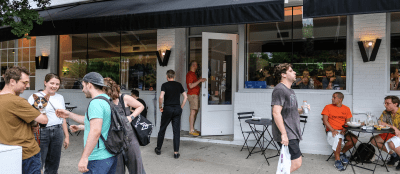At Least There Was Good Stuff to Read: The Best Things We Read Online in 2015

It us.
The Internet is big and weird and often (though emphatically not always) wonderful. We asked some writers, editors, and artists to share their favorite things they found online this year and the results are uplifting, galvanizing, comforting, funny. It’s a great list! We’ve got your essays, your short stories, your police reports, your Facebook feeds, your fan fiction, your Tumblr posts, and an entire human being.
Mark Asch, film editor, Brooklyn Magazine: The NYPD Firearms Discharge Report
In the annual NYPD Firearms Discharge Report, available on its website, the department accounts for every round fired from one of its service weapons outside of a practice range during the previous year. The report for 2014, released in August, is as always a vital account of the realities of policing (not least the NYPD’s self-review practices), during a time when such data couldn’t possibly be more useful. Too, Appendix D, describing in incident-report prose the eight 2014 incidents during which a subject was killed by the NYPD, is a vérité-style glimpse of the very familiar pathos which persists in so many pockets of this otherwise generally very on-brand city. (PS: Of the eight people fatally shot by the NYPD in 2014, six were armed with blades, two with guns. Neither of those guns was fired.)
Tyler Coates, writer: Delilah’s Facebook
I’ve been struggling to remember the big pieces of journalism I read this year, but I’ve drawn a miserable blank. It was a bleak year, really, and the one person who served as a beacon of light and goodness on the Internet was Delilah. Yes, that Delilah—the easy-listening radio host who offers up some love to her listeners every night with affirmations and positivity through her soothing voice and her pitch-perfect song choices. You should imagine that her social media presence is THE BEST, and my favorite thing this year has been following her on Facebook. She offers up her typical brand of heart-wrenching content (plus puppy videos), and is always full of bright, cheery warmth that is otherwise lacking on my newsfeed. Bless her heart.
Claire Comstock Gay, aka Madame Clairevoyant: “The Art of Translation: Richard Pevear and Larissa Volokhonsky” The Paris Review
Not the most important thing I read online this year, but the most personally inspiring and delightful, was the Paris Review interview with translators Richard Pevear and Larissa Volokhonsky. They’re so engaging and warm and smart. They treat language, both its texture and its meaning, with such seriousness and respect. Reading this interview gives me a really visceral sense of the ways that language is alive and in motion, the ways that even 19th century classic novels continue to breathe. So much that’s happened in 2015 has made the world feel small and literature feel deeply, tragically inadequate. When I read this interview, I feel the world opening up again, a little bit.
Runner-up: Cher’s twitter
A. N. Devers, writer: “Pond Scum: Henry David Thoreau’s Moral Myopia” by Kathryn Schulz, The New Yorker
In her wildly intelligent, biting, and hilarious reconsideration of Henry David Thoreau and the beloved Walden for the New Yorker, Kathryn Schultz didn’t convince me that Henry David Thoureau’s work should be entirely dismissed, but she did convince me he was a giant pain in the ass who deserves every bit of stink eye she threw his way. Another reason I loved Schultz’s piece is because it does what the best literary criticism should do: It stirred debate, stirred passions, and stirred important questions about what we’re taught to love in literature and why we’re taught it at all.
Nick Burry, CEO and publisher, Brooklyn Magazine: “The Heart-Stopping Climbs of Alex Honnold” by Daniel Duane, New York Times Magazine
The opening of this article made me puke. I kind of more watched it than read it, though.


Flourish Klink, co-host, Fansplaning: Tangerine by Jen Marks
It’s a One Direction fanfiction, and what I like about it is this: Tangerine is a totally unapologetic fantasy-fulfillment story of the exact type that’s usually denigrated by serious writers and readers. But the author’s taking her writing completely seriously. She wrote a novel-length story, serialized her draft online, found an audience that loves it (459,000 reads!)…and now, even though she could easily just hang up her hat and say “well, obviously it was good enough, lots of people say they love it” she’s editing the whole thing serially online too. And the editing is improving the story immensely! She’s grown as a writer and you can see that growth as you read. To me Tangerine sums up everything that’s great about fanfiction. It’s wish fulfillment, it’s grappling with issues that are relevant to young women (one’s sexuality and how to own it without feeding the patriarchal machine, rebellion vs. conformity and whether rebellion itself is another type of conformity, whether one should be ashamed of liking stereotypical things…), it’s writing for a community of like-minded writers whether or not there’s commercial benefit, and it’s an example of a person finding the context and motivation they need to develop their writing skill. Plus, you know, I’m as much of a sucker as anybody for fantasy-fulfillment stories!
MariNaomi, author and illustrator: “The Husband Stitch” by Carmen Maria Machado, Granta
The thing I read (on the Internet) this year that had the most impact on me was actually posted at the end of last year. It’s a beautiful, creepy piece of fiction by Carmen Maria Machado, and after I read it I couldn’t stop thinking about it. Haunting. She basically took a horror story most every kid knows, and turned it into a sexy, humanizing story about consent. I mean, damn.
Molly McArdle, books editor, Brooklyn Magazine: “A Brutal Beating Wakes Attica’s Ghosts” by Tom Robbins and “Inside America’s Toughest Federal Prison” by Mark Binelli, New York Times
This is my list so I get to cheat. I’ve picked two pieces from 2015: both long, thoroughly investigated pieces of reportage by the Times and both about the American prison industrial complex. More specifically, they both outline in painful detail the brutality and inhumanity of that complex. I cannot think of a better word to describe these conditions than unconscionable. And it’s not a matter of design flaws, these are design features. We have caged roughly 1.5 million Americans, and built those cages to actively, persistently, and severely hurt the human beings inside them. I am most emphatically not okay with this, and neither should you be. We’ve got an honest-to-god moral imperative here to destroy this industry of human destruction, so let’s get to it.
Maud Newton, writer: “My Life as a Muslim in the West’s ‘Gray Zone’” by Laila Lalami, New York Times Magazine
The very best essay I read online, or at all, last year is Laila Lalami’s “My Life as a Muslim in the West’s ‘Gray Zone,'” for the New York Times Magazine. Published a week after the Paris attacks, it introduces Western readers to ISIS’ goal of eradicating “the gray zone,” “the space inhabited by any Muslim who has not joined the ranks of either ISIS or the crusaders.” Lalami herself is a Los Angeles novelist from Morocco whose marvelous most recent novel, The Moor’s Account, was a Pulitzer finalist. At readings she’s often asked not about her fiction but to account for and explain Muslims at large. In the view of ISIS, she’s one of the “grayish hypocrites”: a Muslim who does not perform daily prayers, who partakes of the forbidden drink and has not made a pilgrimage to Mecca. She doesn’t know how to tell her 12-year-old daughter, who’d like to be president, that she’s “not wanted in her own country.”


Kristin Iversen, executive editor, Brooklyn Magazine: “Not Knowing” by Katherine Bernard, The Awl and “The Year in Found Families” by Haley Mlotek, Hazlitt
Up until a couple weeks ago, my favorite thing I read online this year was Katherine Bernard’s beautiful essay on Maggie Nelson’s latest book The Argonauts, in which Bernard grapples with issues similar to those Nelson deals with in The Argonauts, things like the fluidity of identity, the families from which we are born and those we create, and what it means to define who we are, not only to the world but to ourselves. I love this piece because Bernard speaks to the way in which the times in which we’re most uncertain—those times full of not knowing—are when we really grow, when we learn to live. But so, then, earlier this month, I read Haley Mlotek’s wonderful “The Year in Found Families,” which is also about The Argonauts and also about learning how to live, really, and about the quiet spaces in our lives, the ones which we tend to dismiss without realizing their importance, their value. Read these two essays together, then go read The Argonauts. It’s a perfect way to end 2015.
Kevin Nguyen, editorial director, Google Play Books: “How Many White People Does it Take to Ruin a Good Joke?” by Jazmine Hughes, The New Republic
Jazmine has written a lot of my favorite pieces in 2015, but the one I keep going back to is “How Many White People Does It Take to Ruin a Good Joke?”
Like Jazmine, I’ve long been a fan of making jokes about white people. Every POC experience is different, but perhaps the universal thing we can all relate to is that white people are constantly reminding us that we are not like them. The way this manifests itself is usually in well-intentioned-but-othering interactions, so jokes about white people are a great inversion on that feeling. But Jazmine explains it better than I can: “[W]hat most white-people jokes have in common is that they are not about white people per se. Instead, they are about inequalities between whites and other races.”
Which was great until white people started appropriating them. Is it the natural impulse of white people to colonize everything that belongs to people of color, even our jokes about white people?
Jazmine’s piece—patient, smart, painfully funny—deconstructs just why this phenomenon is so annoying, and touches on its more insidious implications. (“[W]hen a white person tells any white-people joke, the humor can go from subverting whites’ status to rubbing it in.”)
Recently, my college-age sister got into a Facebook argument (lol) with some of her classmates about white privilege. I sent her Jazmine’s article, and I felt like I’d armed her with everything she’d needed to shut those fools up.
Miranda Popkey, writer: “The World Jumped Into Focus” by Nozlee Samadzadeh, a Tumblr post
I grow old and my memory is increasingly like to a sieve and this is supposed to be the best thing I read on the Internet, not the best thing ever, right? Which is how I justify recommending pieces I read recently (Claire Vaye Watkins, “On Pandering”), and/or written by humans I already like (Gabriel Winslow-Yost, “Video Games: The Secret Life,” thanks to which I now associate Grand Theft Auto V with clear blue skies and the feeling of safety that comes with riding in the backseat of your parents’ car; Dan Piepenbring, “Points of Sale,” which has either made me anxious about giving Christmas gifts or less guilty about having bought so few). But if I have to crown a winner—and it seems I do—here it is: Nozlee Samadzadeh writing on her Tumblr about her IUD. This has been, in the very best way, both on and off the page, the year of women’s bodies: the year I started to learn how to deal with my own by reading about those that belonged to others. I think about my body so much, and listen to it so very rarely; Samadzadeh’s essay—brief and sharp and honest—reminded me how easy that is to do, and how severe can be the consequences.
Ted Scheinman, senior editor, Pacific Standard: Hanif Willis-Abdurraqib, a person
My favorite reading on the web in 2015 has probably been Hanif Willis-Abdurraqib. He’s a poet of some renown (who gets nominated for, and sometimes wins, important poetry awards), and he also edits the online poetry magazine MUZZLE. But I’m choosing Hanif because, in 2015, he became one of my favorite essayists. Whether he’s writing about Muslim kids at the Bataclan or about emotional adolescence among married men or about Marvin Gaye and the Fourth of July or about how he and his dog navigate anxiety together, Hanif puts race and love and fear and death into simple and devastating terms—moral imperatives tucked within the most human of stories. (Disclosure: I published two of those stories, and I would still love them even if they had appeared elsewhere.)
Parul Sehgal, senior editor, New York Times Book Review: “From Soup to Fish” by Andrew O’Hagan, London Review of Books
I’m always in love with at least half a dozen articles/reviews/essays at any moment so let me cheat a bit by naming my favorite recent piece: this wicked and beautiful Andrew O’Hagan review of a biography of Stephen Spender. I couldn’t care less about Spender, and the biography seems middling at best. But the review—which examines the wages and virtues of the double (in this case, closeted) life—is wiser about human nature than a whole shelf of books. O’Hagan knows everything about how we conspire against ourselves, how we thwart our own ambitions, how cunningly we resist happiness. It’s as tart and truthful—and deliciously quotable—piece of writing as I’ve ever come across.


Lindsay Zoladz, music critic, New York Magazine: “On Spinsters” by Briallen Hopper, Los Angeles Review of Books
Briallen Hopper’s “On Spinsters” was the best piece of cultural criticism I read this year: it begins as a shrewd review of Kate Bolick’s disappointingly prim Spinster, and ends up a rousing, personal celebration of unruly, unconventional femininity in its most radical forms.
Sarah Zorn, food editor, Brooklyn Magazine: “The 2015 Hater’s Guide to the Williams-Sonoma Catalog” by Drew Magary, Deadspin
Obviously it’s the annual hater’s guide to the Williams-Sonoma’s catalog—as integral to the holiday season as A Charlie Brown Christmas. And you better goddamn believe they’ve got Kouign-Amann.
Jane Bruce, photo director, Brooklyn Magazine: “Finding Lamar Odom: Tracking Down the Elusive and Recently Embattled Former Star” by Chris Palmer, Bleacher Report
In October, when Lamar Odom was in the hospital and the world was unsure if he’d make it out alive, Chris Palmer published a profile on him from interviews earlier in the year. The result is beautiful and heartbreaking and a rare look at the side of an athlete you don’t see on the court, or in a reality show. “I’d always say, ‘Don’t forget about me now.’ ‘Never,’ he’d always reply.”
P.E. Garcia, Dead Letters Editor for The Offing and Editorial Assistant for The Rumpus:“I’ll Fly Away: Notes on Economy Class Citizenship” by Donald Quist, The Rumpus
I’ve been friends with Donald for a while now, and I’ve always deeply admired his work. I like to think that we share similar aesthetics and interests in our writing. This piece is particularly powerful, though, in ways that I can only strive for in my own work, for so many reasons: it’s topical without being superficial; it’s personal without being sentimental; it’s intellectual without being detached. It takes one of the most difficult subjects to write about—race in America—and handles it with proper reverence and candor. It is, in short, just really great writing.
Olivia Olivia, essayist and staff writer, The Portland Observer: “You Are Not Special” by Mo Daviau, The Offing
Mo Daviau’s letter to the future victims of an abusive ex-partner, “You Are Not Special” is one of the victories of modern sisterhood. “When people say you have to love yourself, this also means you have to love other women, too,” Daviau pleads. “It is not a wonderful thing for a man to leave another woman for you.” I found myself reading the piece over and over this year amidst a volatile divorce—my English husband threw me out of my home as soon as he acquired his American residency, and a matter of months later had another woman living in my home, sleeping in my bed. I looked to Daviau’s piece for forgiveness and understanding. And I think a lot of other women could make use of the piece who fall on both sides of the coin. The new girl deserves to know. She might not like what you have to say, she might not even believe you. She, like so many of us, wants the chance to be loved by a charming young man. But if you know the truth, if you know his real name, you cannot in good conscience withhold such information from her. Maybe what’s most telling is the way girls of all ages have connected to Daviau’s dead letter. I have seen 14-year-old girls on Tumblr reblogging quotes, and 40-year-old divorcees sharing it on Facebook. I have shared the piece with my mother who comes from a different country, who doesn’t speak English as a primary language, who is in her sixties, and she immediately nodded her head and remembered the second wife of her abusive first husband. What woman is a stranger to the sorrow of being replaced? And in some ways the piece is a call to unionize a little. We’re providing all this emotional and sexual labor to men who don’t always see us as human beings. And it’s tempting to wonder, who is this new girl? Doesn’t she realize what she’s getting into? Why isn’t she disturbed sleeping in a married man’s bed? Shouldn’t we be disturbed by men who call their ex-girlfriends and wives “crazy” and claim they never loved them?
One gem that I’m holding on to forever I shared online and now has over 2k reblogs:
If he tells you what’s wrong with her, how she did not love him the way he needed her to, how she failed to fix that teensy broken part that makes you love him so much, that is not romance. That is planting seeds in a field of horseshit.
If he tells you he never loved her, then spit on him. This does not make him tragic. This makes him cruel.
If he tells you he never loved her, as if that means there is more for you, then he won’t love you, either, because he can’t. At least not with the quiet, hard-shelled love that doesn’t give a whit about what your crotch feels like.
If he tells you she was crazy: think carefully about what that word really means. Crazy gets thrown at women a lot. It’s a way of saying another person’s emotions are inconvenient. It’s a way of punishing them for wanting to be seen, for showing that they have to struggle to get what they need. If a person is truly crazy, they should be supported as they seek professional help. Crazy does not mean garbage. Crazy is not a word applied as permission to quiet someone out of existence.
And this really made me get it. I know one day, and it won’t be if but when the man I loved hurts her, I will be holding open a door at the end of the world with a candle lit and a glass a water and a copy of Mo Daviau’s essay. I’ll be the first to forgive her for whatever she said or believed about me. I’ll be the first to tell her she has a right to be heard. I’ll be the first to believe her. And I’ll be the first to remind her she’s not alone. We’ve walked a similar path, and at least she won’t have to navigate uncharted ground when it comes to this particular sorrow.
If you haven’t read this piece yet, go give yourself a good ten minutes to read it on your phone or computer or iPad or whatever, and then get ready to go do something differently and change the way you think about other women.
You might also like 





















